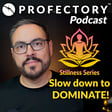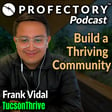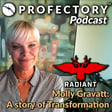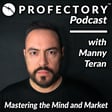Introduction to The Perfectory Podcast
00:00:04
Speaker
The Perfectory Podcast, Mastering the Mind and Market. Hosted by Manny Turan, we explore what it takes to succeed both in business and within yourself.
00:00:15
Speaker
From a strategy and business growth to mindset and resilience, we provide the tools to lead with clarity, confidence, and wisdom.
00:00:31
Speaker
Welcome to the Profectory Podcast, Mastering the Mind and
Why Goals Aren't Achieved
00:00:35
Speaker
Market. My name is Manny Turan and I'm your host. At The Perfectory Podcast, we arm you with insights, tools, and tactics in order for you to master your mind so you can master your market, the business you're running, and the world around you.
00:00:49
Speaker
Let me ask you a question. How many times have you set out with full intention to accomplish a goal, only to look back a few months later not having accomplished it? There's lots of reasons for that.
Stoic Principles and Goal Achievement
00:01:02
Speaker
We leverage a lot of the stoic principles here on the podcast, things like logic, reason, but we're more than that. We are emotional, we are pattern-seeking, we have bad days, we have things that happen in our life that derail us.
00:01:15
Speaker
And there's actually some tools that we'll discuss today that'll provide you a bridge in order for you to get things done. The first of which is the teachings of James
Atomic Habits and Neurocognitive Intelligence
00:01:26
Speaker
Clear. He wrote a book called Atomic Habits, very powerful book, very influential in my life, that outlines what it really takes to set goals, quote unquote, and I'll get to this goal concept in a bit, but the idea that making small 1% changes in your life can have dynamic, huge implications in the future.
00:01:47
Speaker
The second is Chase Hughes, who runs the Neurocognitive Intelligence Institute and teaches a lot of the military intelligence, the subconscious elements of what it takes to accomplish things.
00:01:59
Speaker
Those two coming together with stoicism are going to give you a framework in order for you to get things done. I'm going to break down today's podcast into four parts in order to make it more actionable, more relatable, and in the end, provide you a really good framework to build these things into your life in the way that you live your life so you can get things done.
Ship Analogy of the Mind
00:02:24
Speaker
Part one, your mind has two operating systems. You can think about your mind having the conscious or higher level version of the OS. That's the part that is talking with you today. That's the part that's interacting with the world around me. That's the part that that has the reasoning power to look at certain things and make decisions.
00:02:45
Speaker
That's the part that we are exposed to day in, day out. Then there's the subconscious that lives beneath our awareness. That's the part that runs our own body. That's the part that serves us fear.
00:02:58
Speaker
That's the part that serves us excitement. And ultimately, that's the part that has the most power in derailing or accomplishing the goals and the things that we want to become.
00:03:08
Speaker
Now, the real power comes in the ability, since we can't access it normally, we've got to hack our ability to drive down instructions into the subconscious so that we can actually get things accomplished.
00:03:22
Speaker
And I like to use the analogy of a ship. Imagine your mind being a ship. The captain of the ship is our consciousness. The captain is what is who decides on the values that we live by. The captain decides on where we're going.
00:03:37
Speaker
The captain gives us speeches. And day in, day out is the one that is the one we live in in our brain all the time. Then there's the subconscious, which is the crew. They're doing the day in, day out work. They're the ones that are accomplishing the running this body.
00:03:52
Speaker
They're the ones that are serving us up fear and excitement and motivations. And there's so much that happens underneath the surface, but it's hard to access. Not impossible, but hard.
00:04:03
Speaker
We have some actual tools you can use today that you can reference on the higher level or the captain side in order to get the crew to do what you want.
Impact of Small Changes and Identity Systems
00:04:15
Speaker
Part two, Atomic Habits, 1% to Greatness. to greatness The idea behind James Clear's book, Atomic Habits, is that small changes that we do in our life, small habits that we adopt, will have more impact if done consistently than these big sweeping things that we expect or think will actually accomplish these goals.
00:04:40
Speaker
He uses the idea of that habits almost like compound interest, but in the self-development space. that if we work on these small 1% habits, over time, they'll actually be more impactful than trying to make monumental changes in our life.
00:04:56
Speaker
And I can attest to this. I've actually done this in my own life, and it's had huge implications of positivity, and I've been able to accomplish the goal But I want to talk about that word goal.
00:05:08
Speaker
So we had this idea in our mind that our goal should be the destination. We want to accomplish something like we want to be able to speak a foreign language. We want to lose 20 pounds, whatever it is.
00:05:20
Speaker
But what really has the most impact is creating a system around what we do on a day to day basis. so that our identity will change and we will become the person that goes to the gym and and eat eats right.
00:05:37
Speaker
So the idea is that the goal is a natural result of the identity that we've become. So rather than think, okay, I'm going to lose 20 pounds and I'm going to do all these things in order to lose 20 pounds. Instead, if I focus on, I'm going to be one of those guys that goes to the gym and eats right.
00:05:56
Speaker
I'm going to be one of those guys that goes to the restaurant and ask them to put half of it in a to-go box before it even comes onto my my table. Those changes, those 1% changes is what has more impact than trying to do these crazy things. And that has to do with that idea, again, of the subconscious.
00:06:14
Speaker
The subconscious is really fighting for keeping us comfortable, keeping us safe. And I'm going to tap into that during when I talk ah about Chase Hughes' stuff because it's very powerful as well.
00:06:25
Speaker
So the idea of Atomic Habits, the name of the book, really breaks it down. So atomic comes from the fact that these are small, minuscule atomic level, almost like an atom, changes we make in our life.
00:06:39
Speaker
But the other side of of atomic is it's very powerful. So I have seen this work in my own life and others around me. He uses the idea of traveling. So I'll use this. So say, for instance, you're traveling from LA to Seoul, Korea.
00:06:57
Speaker
and your plane makes a 1% or this tiny, tiny change through that amount of time, if you make that 1% change, you'll actually land in Pyeongyang, North Korea, rather than Seoul, South Korea.
00:07:12
Speaker
Just as in life, you make small changes every day, and in the end, all going to have these major impacts. He talks about the the British racing team that had a 100-year drought of winning these major awards like the Olympics or the Tour de France.
00:07:28
Speaker
So they made these changes. They brought in some folks that had this mindset in mind, and they made all these minute changes like they painted the inside of the vans white. so they could see any foreign objects like dirt or nails or whatever.
00:07:43
Speaker
They brought in doctors to teach the riders how to wash their hands properly so they wouldn't get sick. They brought in people that had expertise on sleeping and even recommended pillows they should use.
00:07:57
Speaker
they They did so many things with the the bibs that we're wearing. So they focused on all these elements. And while they're tiny, collectively, what they did is they propelled the european or the um the British racing team to win the Tour de France, to win the Olympics, and really changed the course of who they are and their identity change, of course.
00:08:20
Speaker
So this concept is really about systems. You create systems around you in order to create habits in order to change your identity about the person that you are so that you can accomplish those quote unquote goals.
Creating Lasting Habit Systems
00:08:39
Speaker
Let's use the example of getting fit. Say you want to lose 25 pounds or gain 10 pounds of muscle or whatever, which is something I did, by the way. I lost weight, I gained muscle, and I did it by doing what?
00:08:51
Speaker
By focusing in on these these systems around my house so that it'll it was very, very easy in order for me to go to the gym and eat right. That means laying out my clothes or putting my my shoes by my bed before I go to bed.
00:09:07
Speaker
That means that creating the space, paying for a personal trainer so that I've gotta go. If I don't, I lose the money. That, believe or not, is a huge system in place.
00:09:19
Speaker
in order to get me to go there. Because oftentimes I'm laying in bed, I don't want to go, it's 5.30 in the morning, and the last thing I want to do is get up in the cold and go to my my workout. But every single time without fail, after I'm done with my workout, I'm so glad I did.
00:09:33
Speaker
And it's the systems that I put in place in order to reach that goal that that has allowed me to accomplish the goal. Something about the goal that I'll also mention is that in conventional thinking,
00:09:47
Speaker
Once you reach that said goal, now what? So if your goal is to is to lose 25 pounds and gain 10 ton muscle and you get there, Then what? Then you're going to take a back seat.
00:09:58
Speaker
Then you're not going to go to the gym. Your diet's going to go out the window and you're going to fall right back into place and gain the weight and sometimes even gain more weight and it's gone. But if your identity is different, if your behaviors are different, if your habits are different and if your systems are different, then you will accomplish the goal, the end goal of what you you really want is to be a fit person who lives a life of being athletic, muscular, and slim, or whatever.
00:10:25
Speaker
And that is way more impactful than actually just reaching the goal by itself. So this idea is very powerful. I suggest that you pick up his book. He's got lots of podcasts about performances out there as well.
00:10:38
Speaker
And it's a framework you can use in your day-in, day-out life in order to accomplish your said goals. But really, it's about creating a new identity for who you are that is the person that will accomplish the the goal as a result of your identity.
Subconscious Self-Sabotage and FEAR Tool
00:10:55
Speaker
Part three, under the hood, understanding the subconscious mind. We learned in the previous segment that willing our way to accomplishing our goal or whatever you want to accomplish is almost impossible.
00:11:12
Speaker
We learned that we had to create systems. in order to change our behavior, in order to create habits so that our identity changes to become the person that will accomplish that said goal.
00:11:27
Speaker
And we learned that process that our subconscious mind is fighting us in that whole idea. ah want to go deeper. ah want to leverage the teachings of Chase Hughes, who is a behavioral scientist and runs the neurocognitive Intelligence Institute, wrote the Behavior Ops Manual, this book here, which is a lot of information.
00:11:50
Speaker
I'm just going to give you a flavor of what he teaches. And the idea is that our subconscious mind will try to self-sabotage our day, our decisions all the time. Let me give you an example.
00:12:03
Speaker
Say, for instance, you're going to go to the gym the next morning. You decide to go and the to the gym. And you don't have ah an expensive personal trainer. You're just going to go to the gym. It's 5.15 in the morning.
00:12:13
Speaker
You're laying in bed. You should be up. But your subconscious mind tells you, man, that bed is so nice and warm. It's so nice. you you really You really do need your sleep. You should just sleep right now.
00:12:24
Speaker
And so you slide in into sleep. You should just stay there. You don't go to the gym. The idea is that your subconscious mind is fighting you to keep you comfortable because it prioritizes safety, number one, comfort, number two.
00:12:39
Speaker
Stepping out of your comfort zone is hard. It's difficult. It puts you out there. There's lots of sayings like the things you want in life are on the other side of comfort or that comfort is a killer, which are both true, by the way.
00:12:55
Speaker
And there's been absolutely no time at all When I've decided to go to the gym against my my will, quote unquote, my higher self, I go to the gym. In my case, I've got a system.
00:13:07
Speaker
Get to the gym, not really wanting to be there. Do my workout. There's been zero times when I've regretted that. Every single time, I'm happy I did. And the idea that he talks about is that, sure, the emotion is the conversation that we have in our subconscious, and it manifests its way out.
00:13:26
Speaker
We know it. We've seen it. We've felt it. We've dealt with it. He uses something called fear to brainwash your mind. And fear, not that fear, but let me give you the the acronym here. of Fear is focus, emotion, agitation, and repetition.
00:13:46
Speaker
The idea with focus is you want constant daily reminders of your habits, of your behaviors, of your goals, if you will. Constant. I actually have a screen in my living room with rotating like a vision board with 125 pictures that rotate every few seconds that paint the picture of my, quote, vision board.
00:14:09
Speaker
Now, I don't believe in the manifestation in the kind of the woo sense. I believe what it does is it arms our brain, our reticular activating system, in order to identify opportunity and give us the confidence to lean in when we would normally not lean in.
00:14:25
Speaker
I think that's how it works, in my opinion. and And so this focus gives me that. The focus is I write my goals down and review them on a Sunday night before the week.
00:14:36
Speaker
Usually it's on my phone. I'm looking at what ah what I need to do that week. And i it's a constant reminder. I've got to constantly be on top of my focus and know what I need to do. The second thing is emotion. You want to create a deep emotional connection with that future self. Okay?
00:14:54
Speaker
He recommends, Chase recommends, that you download one of these apps that will give you an aged picture of who you are. And I did that. And I did two versions of it. i so I did the one that had a very positive, very healthy, very virile version of me in the future.
00:15:11
Speaker
And I did one of one that is not watching what he eats, drinking too much, um not exercising, and they're both very different. That emotional attachment, that emotion,
00:15:24
Speaker
The black and white gives me a tremendous amount of motivation to get my butt in gear. The next one is agitation. Agitation is you want to disrupt old patterns.
00:15:36
Speaker
That means it could mean rearranging your furniture. It could mean changing your wardrobe. It could mean decluttering. You want to agitate and create some some disruption in your life because you're settling into these grooves of your habits.
00:15:50
Speaker
If you if your're one of your habits is going to a particular coffee shop or or restaurant and you're you're exposed to ah dozen chicken wings on a Monday or you're exposed to that croissant that's just sitting there all the time, if you want to really accomplish the the physical goals I mentioned for myself at least earlier – I want to take myself away from that. I want to create agitation in my life.
00:16:13
Speaker
And so I want to do other things. So figure out what those things are and lean into them because in the end, they're going to give you the separation and that new direction that you need to accomplish your your whatever you want to do.
00:16:26
Speaker
And the last one is repetition. Repetition is doing things day in, day out. That means that you know as human beings, we are social animals. We like repetition. We like certain things to be a certain way. Not everybody has the same grade of that.
00:16:41
Speaker
Some people like lots of change. But people that like like lots of change also have some level of wanting things to be the same. If your meal is changing, whether you eat it at 7 in the morning or 11 in the morning or whatever, you're going to want some level of of consistency in order to create that repetition so you're eating right.
00:17:01
Speaker
So your first meal is at 11. you know, things are going to happen, so you might have to move it from time to time, but you want to keep that repetition. You know, for instance, in the morning, I drink a big glass of water. i get my my my body moving, and I've got to do it. Otherwise, i don't feel the same.
00:17:17
Speaker
And I've recognized that I tied that big but back into my emotion that I need to create that repetition. and And ultimately, Understanding your subconscious mind and having these tools and tactics in order to to tease away from the status quo is going to give you more tools, more ammunition in order to create those systems and the behaviors and the habits and the identity to accomplish the goals that you set out to.
00:17:48
Speaker
Part four, bridging stoicism with modern psychology.
Integrating Stoicism and Psychology for Change
00:17:53
Speaker
This is where the perfectory lives, at the intersection of timeless wisdom and modern research-based tools and insights.
00:18:06
Speaker
We just learned that we can't simply just will our way to get things done, that our subconscious mind is always going to prioritize safety and comfort over some future self that we want to become.
00:18:22
Speaker
You know, in Stoicism, we're taught all about self-governance. We're taught about logic. We're taught about reason. We're taught about how to react to the world around us. We know...
00:18:34
Speaker
And we just learned as well that we are emotional creatures. We seek patterns. We get pissed off. We have good days. We have bad days. And you mix these things together, and we've got to create systems around us that'll get us to what we need to be. We also need to understand the subconscious mind because there's there's a tremendous amount of power in order to to create these tactics and tools to hack our brain, our mind, to get the things done that we want to get done.
00:19:02
Speaker
So if we combine the teachings of James Clear, the systems thinking, with the understanding of how to reprogram the subconscious mind by Chase Hughes, blend it together with stoic principles of self-governance, we have a very powerful tool to make huge change in your life.
00:19:25
Speaker
Now, it breaks down to a lot of little things, again, atomic habits for you to do. But I broke it down into four things to move forward with.
00:19:37
Speaker
But before I talk about those four, I invite you to go out and spend some time online to start with understanding the teachings of James Clear and Chase Hughes.
00:19:50
Speaker
You can look on, there's a podcast, there's interviews, there's YouTube videos. They also have courses, there's books, there's Get immersed in that if you really want to reach that higher level person.
00:20:03
Speaker
And there's just a vast amount of information. i just began talking about, I mean, for instance, Chase Hughes' book here is almost 800 pages. I'm not going to get much information to you from that book, but the very high, high, high level information. I wanted to give you at least the directions of where to go to get the information.
Four Steps for Personal Change
00:20:25
Speaker
But let me dive in The first of which which you want to, number one, define your identity. Who is that person that you want to become? Focus more on identity and less about things you want to accomplish.
00:20:40
Speaker
And you want to paint as clear a picture as possible. And that picture is in the form of things you write, like in a journal. That picture is in the form of maybe even using one of those tools, maybe using using Photoshop.
00:20:57
Speaker
Having an AI tool puts you in a particular place. Because one thing I didn't talk about is your brain cannot distinguish between reality and deeply ingrained thoughts.
00:21:12
Speaker
Your brain also doesn't understand, your subconscious mind does not understand the word no. This is why when you're um doing something and you're saying, I don't want to fall, I don't want to fall, i know you you have a tendency to fall more.
00:21:26
Speaker
Rather than you might want to say, ah want to want to be standing, i want to be standing, I want to be standing, because your brain doesn't know it. All your brain hears is fall, fall, fall, fall. And so number one, define your identity.
00:21:37
Speaker
Number define your identity. Design systems around you to make that, accomplishing that identity frictionless. You want to make it as easy as possible.
00:21:49
Speaker
if your're If your identity is to be a person who is in shape, who is virile, who is is living life with vitality and abundance, then in your whole life, create No friction in order for that identity to be true.
00:22:06
Speaker
That means getting rid of friends that don't serve you. That means getting rid of family that, I mean, this and this is some controversial stuff, right? Getting rid of family and friends that don't they don't support you.
00:22:17
Speaker
You can still love them, but just push them away. That means rearranging your life. That means getting rid of going in your pantry, getting rid of all the stuff that doesn't serve you. That means getting rid of decluttering.
00:22:28
Speaker
That means whatever it means in your world to create no friction, do it. Another thing that I didn't talk about that James Clear talks about is the idea of habit stacking. That means on top of one habit you already have, you put ah new habit.
00:22:43
Speaker
And by doing so, you have more of a propensity to make it a lasting habit.
00:22:49
Speaker
Number three, engage your subconscious. So this has to do with visualizing that future person all the time, as clear as possible.
00:23:01
Speaker
Get one of those apps. Write it down. Write messages on your mirror. So you want to engage your subconscious. And of course, we learned that emotion is the language of the subconscious.
00:23:15
Speaker
I like to do something in the very early morning, As I'm waking up, there's about 30 seconds when and you're halfway in, halfway out. And by the way, I don't use an alarm typically. So maybe if you use alarm, it might be more difficult. But for me, in that halfway point, I visualize something that I want to become true.
00:23:35
Speaker
And all that's really doing is because my mind can't separate reality from from something that is just fiction, I'm basically telling my brain that this is already happening.
00:23:46
Speaker
And it gives me that that edge. I mentioned earlier the ability to identify opportunities and act upon them. It gives me that edge. So in my brain, I feel as though that's already happened.
00:23:57
Speaker
I visualize whatever I want to accomplish already happening. um Matter of fact, i sort of, quote, unquote, manifested an RV, right? This podcast will be broadcast from an RV here very soon. We're retrofitting it.
00:24:11
Speaker
But I had that on my vision screen three months ago, and I saw the opportunity, or maybe it was six months ago, saw the opportunity, took it, and now it's becoming reality.
00:24:22
Speaker
And that because that's because it's a daily reminder. It's a lot of happening under the hood in the subconscious mind, a lot of calculations, and um it just has to be always reminded through this subconscious emotional connection.
00:24:38
Speaker
Number four, and this is the part where it really comes from some level of stoicism as well, and that is practice stillness. So you want to listen to the resistance that comes from that stillness.
00:24:53
Speaker
You want to work with it, not against it. And, you know, meditation is a very powerful tool that I recommend that you do. And it's nothing too crazy. People think meditation has to be this huge, grandiose thing where you got to sit down for an hour and you're you're going to be uncomfortable and you're going to have to have incense burning. And, you know, meditation could be walking around the block.
00:25:19
Speaker
Meditation could be sitting for 30 seconds, feeling your feet on the ground, feeling your butt on the chair, listening to the air conditioning, listening to the birds, and just focusing on that.
00:25:29
Speaker
Because what stillness really does is it takes the break off momentarily of your mind and lets it kind of stop fighting itself. It just free flows. So when I meditate, sometimes I have things come into my brain and I don't push back.
00:25:44
Speaker
I've learned to just let it go. These fears, they come in, they come out. These aspirations, they come in, they come out. Even if they're good or bad, i just let them flow.
00:25:55
Speaker
And what's happening is, though I feel as though it's reorganizing my subconscious mind so that when I break from that meditation, I'm now more aligned, I've got more calm.
00:26:08
Speaker
And by the way, I think calm is something that is super powerful. And it's a tool that I wish I would have learned how to do better as when I was younger. Because I had a tendency to be very reactive.
00:26:21
Speaker
I had a tendency to say things that were hurtful or that were painful or that were devastating at times in business and in life. And having practiced calmness, which is a daily practice, by the way. It's not like I'm healed. It's a constant, constant, vigilant practice.
00:26:41
Speaker
I need to practice calm. When I sit with the stillness, when I sit with the meditation, it reinforces that and it makes me calmer throughout the day. And it also helps with just bringing down your blood pressure, your stress, very powerful.
Conclusion and Future Excitement
00:26:56
Speaker
So to kind of wrap up, Perfectory's all about arming you with these outside tools, right? Understanding trends, understanding the way the the market works.
00:27:06
Speaker
And we're gonna talk about lots lots of stuff like that, but also understanding the inner self. these things I just talked about, these topics. you know If you found this valuable, I would say please share this with people around you.
00:27:18
Speaker
Please rewind, please um subscribe, please be part of the conversation. I'm doing this because I feel very compelled to share my story and what I've learned in life and this medium, which I'm very happy that exists.
00:27:33
Speaker
is able to let me share this with my audience. And I'm excited for the guests we have coming up. We have some very impactful guests that will blow your mind. We have some really cool topics that we'll address.
00:27:46
Speaker
And with that, I am thank you for your time and very thankful for this opportunity.








